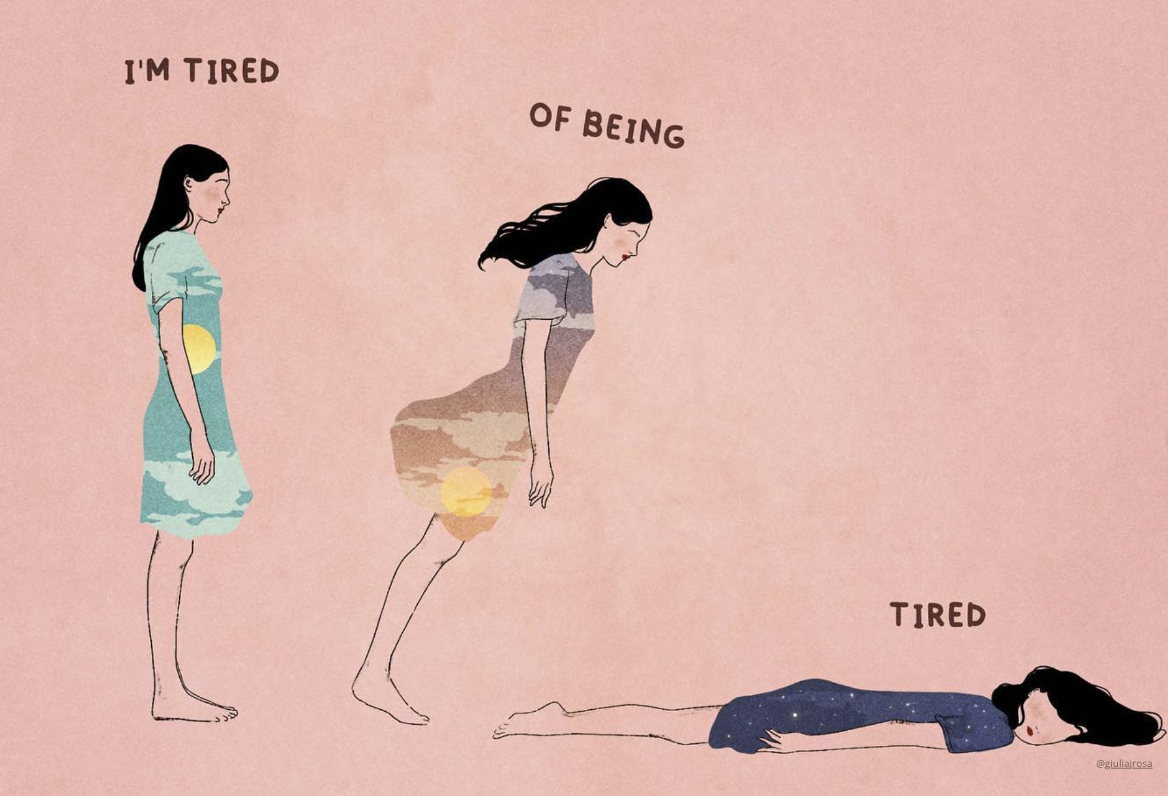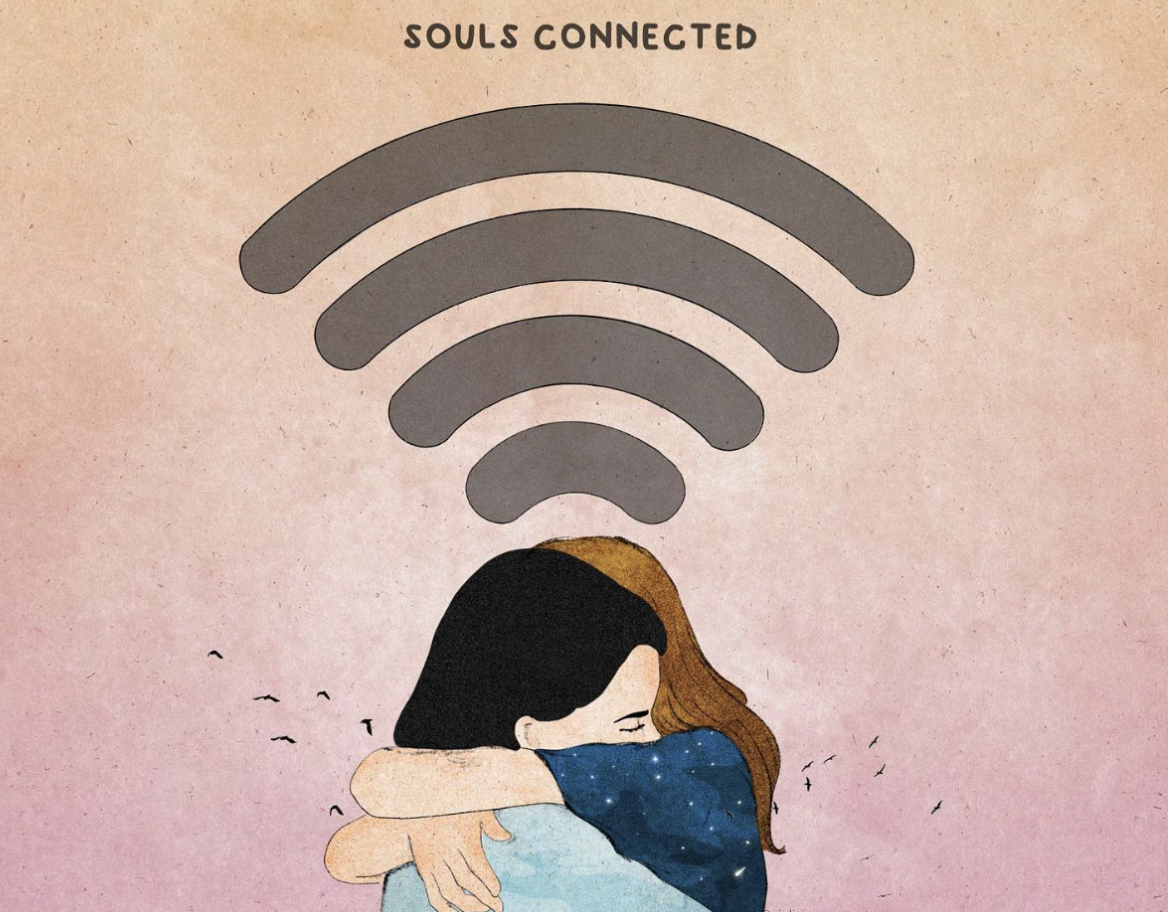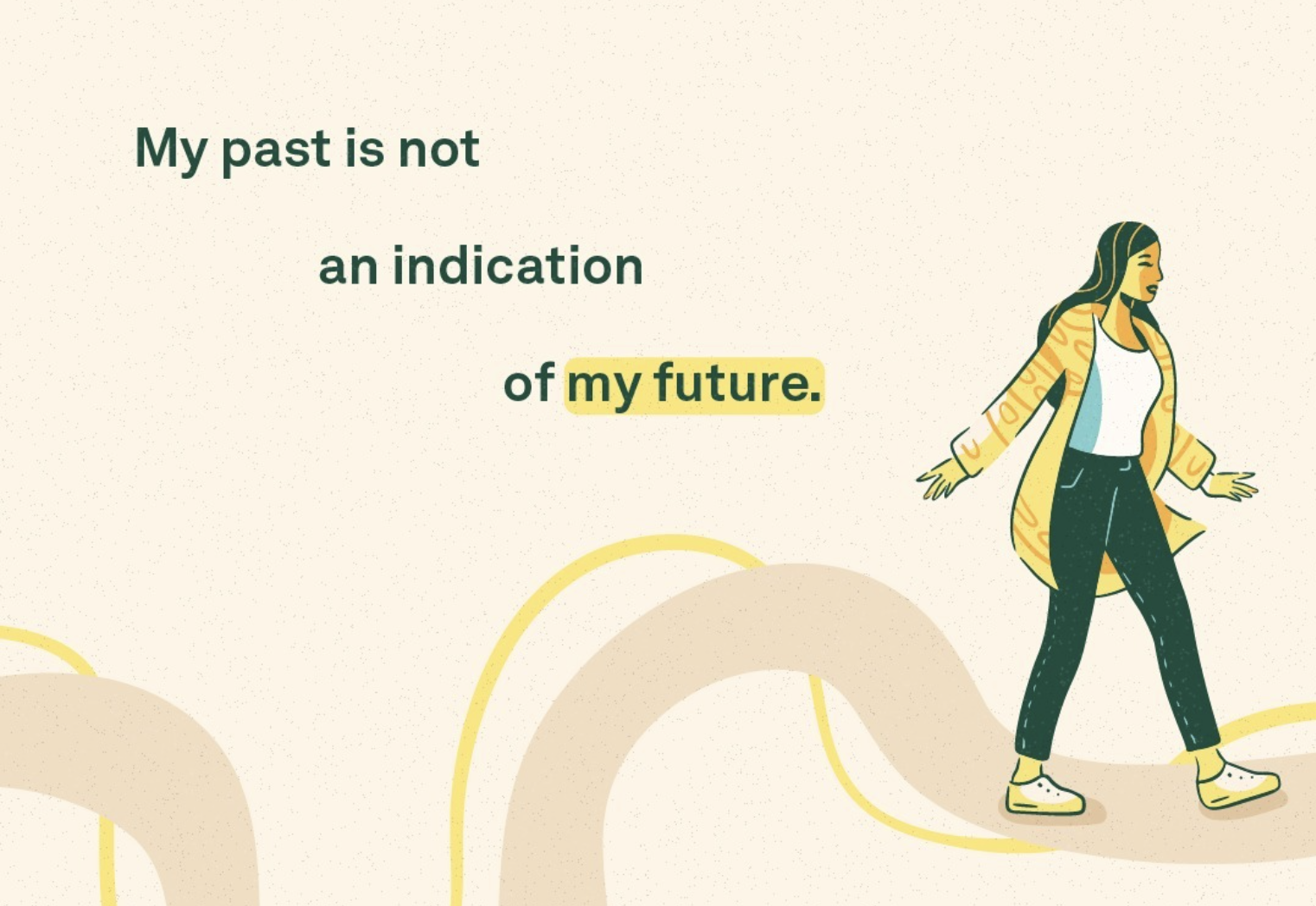View this post on Instagram
This article is written in partnership with BetterHelp. They’re dedicated to helping folks get easier, more affordable access to mental healthcare, and we’re proud to work with them. ~ ed.
“Are you afraid of happiness?”
I was taken aback, realizing I didn’t really know the answer to her question. But I didn’t think so, telling my therapist, “No, I’m desperate for it.”
Then she said I might be fearing happiness to protect myself from losing it.
Well, hell, that was a good point.
It was one of a few great points she’d made since I first signed up for BetterHelp, an online therapy platform with a roster of more than 30,000 therapists, and started weekly video therapy the month before.
I’ll admit I was hesitant to go to therapy. I’d done a lot of self-healing with my depression over the last several years and found more relief on my own than I had in the past when I’d tried it. I didn’t think a therapist could tell me anything I didn’t already know.
It wasn’t that I didn’t believe in therapy. I’ve always encouraged people to try it, knowing we’re all different and that it helps many people suffering from mental illness, but because of my personal failed experience, I simply didn’t believe it could help me.
Oh, how wrong I was.
When I signed up for BetterHelp and filled out the online questionnaire, my first worry was that I wouldn’t click with the therapist chosen for me.
I didn’t want to waste any time. I had an agenda and felt like I was coming into this with a lot of knowledge, but I was so damn tired of feeling depressed. It was a big enough step to finally accept some professional help, and I wanted to hit the ground running.
Get Help Fast and Take 50% Off your First Month >>
I didn’t trust myself to feel comfortable switching to a different therapist, although BetterHelp makes it easy to change and I could do so at no additional charge or cost.
I feared it could turn into a downward spiral of head trash—judging myself for judging my therapist—but I was determined to do it in hopes of finding the right person to help me finally kick my recurring, debilitating depression.
 Luckily, I was assigned an incredible therapist who has helped me immensely in less than two months.
Luckily, I was assigned an incredible therapist who has helped me immensely in less than two months.
Sometimes even the smallest revelations can bring up exactly what you didn’t know you needed. Once I became aware that a lot of my self-destructive behavior was being driven by fear, a path of glowing stepping stones began to light my way out of the darkness.
And then I knew I could change my behavior; I could do things even if I was scared.
I would crawl out of my dark and comfortable cave of guilt and shame; I would feel happy again.
Abandonment, rejection, and loss—in less than nine hours of back and forth conversations—mostly forth from me, crying over feeling stuck and unable to find lasting contentment—my therapist pointed out three simple things that woke me up to my troubled relationship with happiness.
And she changed my mind about the benefits of therapy, too.
1. Setting Boundaries without Fear of Abandonment
It didn’t exactly start out that way, though. For the first month, I regularly wondered if therapy still wasn’t for me.
Week after week, I was tearfully venting to my therapist about the drama consuming my life. I wasn’t using her helpful worksheets or taking her advice and, most often, when I logged on to our scheduled live video session, I began with, “I’ve failed again.”
It seemed like no progress was being made. I felt I was wasting our time because I wasn’t “walking my talk.” Did I really want to heal, or would my mental health be forever at the whim of life’s distracting, frustrating, and depressing circumstances?
I began to dread our therapy sessions because I wasn’t putting in the effort to feel better.
I feared her honesty about what I needed to do and my ability to hear it. I feared her inevitable abandonment when she realized that maybe I didn’t really want to help myself, and therefore she couldn’t.
The fear of that truth began messing with my head.
But then, she pointed out something that took away a lot of my fear:
“You can say no to the drama for your peace. If people need to vent, they can get their own therapist!”
Oh my, talk about an aha moment.
She was trying to help me learn to establish boundaries. At the time, I was being bombarded with people leaning on me due to a serious betrayal from a family member. I knew this person’s actions and the resulting fallout was completely out of my control, so why was I so distraught over saying I didn’t have the mental capacity to handle their suffering or be involved?
How could I tell them I couldn’t be what they needed me to be?
This moment of candid truth became a turning point in my therapy.
Discover your turning point (50% off first Month) >>
After I expressed my disappointment for not making progress, which was truly a huge thing for me to admit considering my people pleasing personality, my therapist pointed me to the Five Stage Model of Change.
This explained why I was feeling like I was going nowhere with our sessions. The five stages of change are precontemplation, contemplation, preparation, action, and maintenance. I fell somewhere in between the first three stages and realized I wasn’t quite ready for the action to improve my mental health, much less maintain it.
And that was okay! She told me this is common for people beginning therapy and I felt immediate relief. I wasn’t unredeemable. Maybe (just maybe) this therapy thing could actually work for me.
Suddenly, I knew that my “healing agenda” didn’t have to be on a timeline. Yes, I wanted to make progress—remember my desperation for happiness? But I understood that simply having a person to turn to, whose job it is to listen to me vent, was exactly what I needed.
It brought up memories of the last time I truly vented everything to someone, way back when I was a teenager and lost a best friend over it.

She was mature enough to recognize the difference between venting and emotional dumping and to state her boundaries. I was immature enough to break up our friendship over the pain of being told, “I can’t handle your problems anymore,” because I internalized it as, “I can’t handle you anymore.”
Twenty-eight years later, my bestie and I have a good relationship, but I’d be lying if I said I don’t still hold back a lot of myself when I feel the need to vent to her or anyone else.
The fear of burdening others with my sh*t is all wrapped up with my fear of abandonment and likely why I can’t say no when others do it to me.
I’m so grateful to my therapist for being that person for me, and to BetterHelp for making it so easy to find and connect with her.
After that, I no longer dreaded my therapy sessions. I looked forward to them and let go of any preconceived expectations I put on myself.
If I needed to cry to my therapist for 45 minutes about family drama or fearing my husband’s sudden death or my constant failings and hopeless emotions—I could. She wouldn’t abandon me for sharing too much. She encouraged me not to hold back, and for the first time in a long, long time, I felt safe.
I trusted her, and the value of having a good therapist in my corner increased exponentially.
Soon, we began delving into my guilty feelings over not being enough for those I loved.
2. Fostering Relationships without Fear of Rejection
Before we started our first session, my therapist asked me to list the top three things I wanted to work on. One of those things was fostering my relationships.
I was feeling a lot of never-ending guilt for not being a good wife, friend, sister, auntie, daughter, stepmother, and, most of all, grandmother. My depression had gotten the better of me off and on for much of my life, and I was used to my coping strategy of isolation.
But my comfort came with a lot of guilt and shame for not being there for people.
I admitted to my therapist that my relationships are only good when other people are fostering them. I never call anyone and rarely text to check in with loved ones. I use social media to promote myself rather than to connect.
Reconnecting with people after so much hiding and lack of involvement in their lives felt arrogant and selfish.
Why should anyone answer me when I’ve put in no effort for so long? How can I expect a real relationship when I’ve contributed nothing to it?
The guilt of not reaching out was eating away at me.
I justified it over reasons of protecting myself from conditions or expectations or being sucked into drama, but the truth was that I was protecting myself from rejection. I couldn’t handle the thought of being given a taste of my own medicine, of being ignored because I deserved it.
So, I continued hiding and I felt terrible for doing it.
My therapist encouraged me to reach out anyway. She said it didn’t matter what the outcome was because their response wasn’t the point.
My action wasn’t for others—reaching out was for me.
Reach out to a therapist for yourself (50% off first month) >>
It was to take away my guilt and get myself out of my head so I don’t stay stuck in a cycle of worthlessness. She said that just the act of reaching out would help me feel better, and she was right.
I finally sent a text I’d been meaning to for a long time. The outcome was somewhat as expected, but any negative feelings were instantly balanced by the release of my guilt for overcoming my fear and coming out of my safe and lonely hiding spot.
Trust me, it’s better to feel lonely knowing that you’ve tried, than to feel lonely because you think you deserve it.
3. Allowing Happiness without the Fear of Losing It
After pointing out that I may be fearing the loss of happiness, my therapist then asked me if I self-sabotage. Without hesitation I answered, “Absolutely.”
And then a bright blue buzzing neon sign that read epiphany flashed inside my mind.
I recognized that my self-sabotaging patterns were a cause rather than an effect of my fear of happiness, and that was a profound reflection.
I am so scared of losing it that I deliberately push away any chance at happiness.
Even when I’m not feeling particularly down, I will self-sabotage to bring myself back there. I’ll reward myself with things that aren’t good for me, like alcohol, junk food, or binge streaming. I’ll give in to skipping my beneficial but tedious good habits, like meditation, journaling, or brushing my teeth. I’ll skip workouts or ignore the dirty dishes.
And I’ll hate myself for doing it.
My sadness is a comfort zone, predictable and better than feeling the pain of losing something I’m so desperate for, so I mindlessly bring myself back there over and over again.
I think I’m addicted to the comfort of my own suffering.
I push away happiness because I fear my depression is bound to come around again, no matter how great things may be in my life, and no matter how well I’m committing to good habits that keep me in a healthy headspace.
It’s happened so many times. Earlier this year, feeling like I was finally going somewhere with my writing (ironically about my healing journey), I was extremely upset when my depression came roaring back after burning out with all the work to promote myself. I felt like a complete fraud.
But that was just another form of self-sabotage. I resist establishing boundaries around my passions. My self-care and mental health inevitably decline, bringing me back to my familiar comfort zone of suffering.
It’s safer to simply stop creating because then I won’t feel the pain of failure when I can’t sustain it.
I no longer feel hopeless, though. I know I can change. I no longer feel that happiness is impossible for me.
I’m so grateful for my therapist’s perspective. These three simple, yet deeply impactful points are helping to change my mindset around fear and my relationship to happiness.
I’ve gotten out a lot of tears and thoughts that I’ve never been able to tell anyone. It’s like clearing out the clutter from your home before beginning a major remodel. Now, it’s time to build upon the good habits that will keep the clutter from overwhelming me again.
Clear out the clutter of your mind from the comfort of your own sofa. >>
My therapist reminds me every week that all I have to do is try. That is enough, no pass or fail.
I never believed a therapist could help me so profoundly. I’m beyond thankful to BetterHelp for changing my mind on the benefits of therapy.
Online therapy is where it’s at, ya’ll! It’s so easy, all you need is a cell phone or internet connection to start getting help immediately.
If you’ve been struggling with your mental health, no matter how minor or debilitating, I encourage you to sign up for BetterHelp to find that person you never knew you needed in your corner.
If it can help a stubborn, know-it-all, self-healer like me, I promise, it can help you too!
~
“BetterHelp provides several different ways for you to be in contact with your therapist. You can use messaging (like text), real time text chatting, voice calls, and video sessions. All are done through the BetterHelp platform which can be accessed from your phone or your computer. Pretty much all you need is yourself, good wifi, and a comfortable place to talk. Everything else is taken care of for you.” ~ Jennifer Glace, LCSW



Read 17 comments and reply